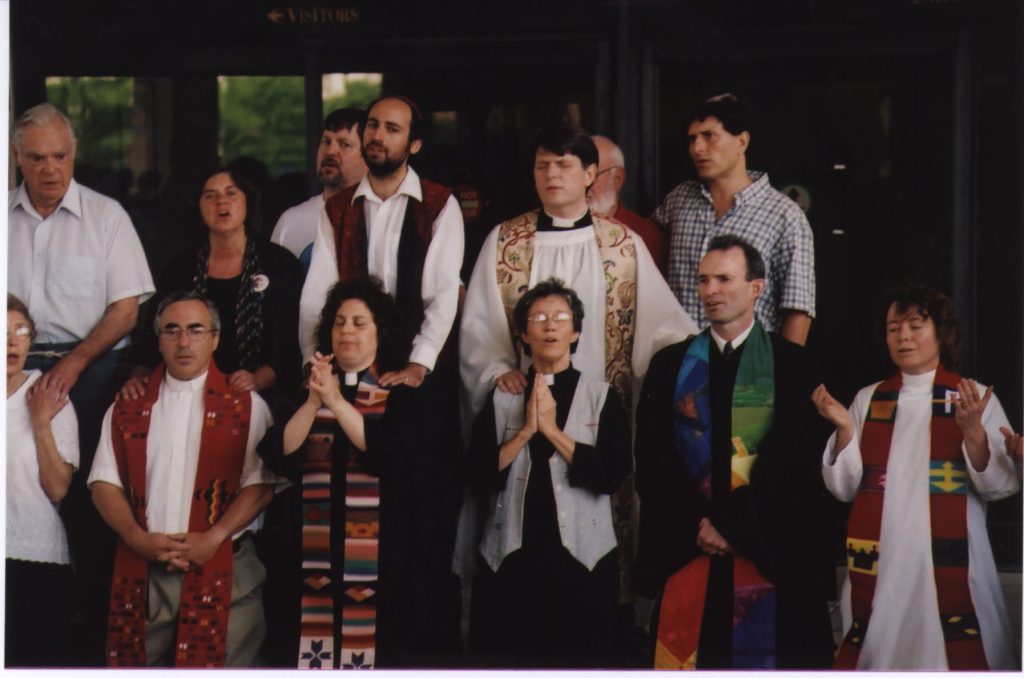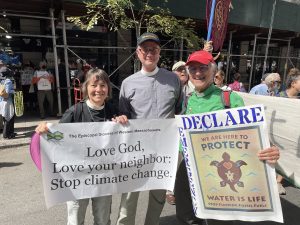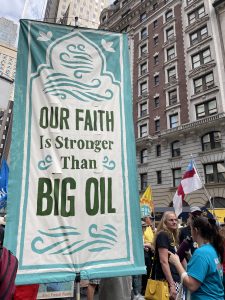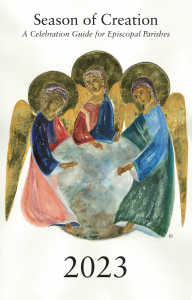Put your hand out. Do you feel a thread? To what is it connected? Where does it lead?
I started playing with these questions after reading The Princess and the Goblin, a fantasy by George MacDonald, whose work influenced Lewis Carroll, G.K. Chesterton, J.R.R. Tolkien, and C.S. Lewis. This classic children’s story is full of mythic, archetypal symbols that would resonate with Carl Jung. There’s a royal castle aboveground, a goblins’ castle underground, a princess, a peasant, a magic fire, a magic ring, and a secret tower where the princess’ beautiful great-great-grandmother lives.

But the image that particularly drew my attention was the image of an invisible, sacred thread. The great-great-grandmother sits in the tower, spinning a delicate thread woven from spiderwebs and filled with moonlight. She ties the thread to a ring and gives the ring to the young princess. She tells Princess Irene that when she is frightened or in trouble, she should put the ring under her pillow and follow the thread.
“Then you must lay your finger, the same that wore the ring, upon the thread, and follow the thread wherever it leads you.”
“Oh, how delightful! It will lead me to you, grandmother, I know!”
“Yes. But, remember, it may seem to you a very roundabout way indeed, and you must not doubt the thread. Of one thing you may be sure, that while you hold it, I hold it too.”1
Sure enough – when Irene awakens one morning to a frightful disturbance, she puts the ring under her pillow and lays her finger on her grandmother’s thread. Although she can’t see the thread, she can feel it under her fingers. To her surprise, it leads her outdoors, away from her grandmother’s tower, up a steep mountainside and then down into caverns deep underground, where she reaches an impenetrable dead-end:
…[She] came to a huge heap of stones, piled in a slope against the wall of the cavern… [The thread] vanished through the heap of stones, and left her standing on it, with her face to the solid rock. For one terrible moment she felt as if her grandmother had forsaken her.2
Dismayed, Irene begins to weep. At length she decides to follow the thread backwards and go home.
But the instant she tried to feel it backwards, it vanished from her touch. Forward, it led her hand up to the heap of stones – backwards it seemed nowhere.3
Irene is alone in the dark with no way forward, no way out, and no way through. She weeps in despair.
I won’t explain what happens next – you’ll have to read this wonderful story for yourself. But here’s the point: by daring to follow the thread with a trusting heart and by doing whatever she must to stay connected with the thread – even if it demands all her courage, even if it requires the physical effort of laboring in the dark and enduring an aching back and bleeding hands and fingers – the princess not only finds her way to freedom but also saves the life of her friend, who in turn saves everyone from the goblins.
Entranced by the idea of following a thread, I began musing on the threads that appear in legends and folklore around the world, from Ariadne’s thread that guides Theseus out of the labyrinth of the Minotaur to the invisible red thread of Chinese mythology that connects two people who are destined to meet. I got curious about whether there might be threads to follow in the Bible. Sure enough, I quickly found references to red threads, blue threads, and even spiders’ threads, but nothing about following a thread. Finally, in Chapter 11 of the book of Hosea, I found what I was looking for.
The prophet Hosea portrays God’s compassion in terms as gentle as George MacDonald’s account of the great-great-grandmother tending Princess Irene: like a devoted mother, God loves his/her children, teaches them to walk, and takes them up in the divine arms (Hosea 11:1-3). God says, “I was to them like those who lift infants to their cheeks. I bent down to them and fed them.” And God also says, “I led them with cords of human kindness, with bands of love” (Hosea 11:4).
Ah! There it was! God leads us by invisible cords of human kindness and bands of love. We are given an invisible thread to follow, and that thread connects us to a divine compassion as tender as a mother’s love.
Well, it seemed to me that following the thread was a tangible way to practice the presence of God. I began bringing the thread to mind as I went through the day. I imagined feeling it between my fingers. Was I following it as I made choices about what to do, what to say, how to say it?
A thread is a tiny thing, and an invisible thread seems like nothing at all. For all of us who are trying to accomplish the seemingly impossible – protect democracy from authoritarian rule, stabilize a climate hurtling toward chaos, build peace in a war-torn world, restore justice between races, stop gun violence (feel free to add whatever you like to the list) – in short, for all of us who feel called to a mission that we can’t do alone and that won’t be completed in our lifetime, it may be cold comfort to know that all we have is a thread to follow. Perhaps, like Princess Irene, we find ourselves alone in the dark with our face to solid rock.
Yet the thread of love is trustworthy. Following the thread will keep us on the right path, for when we hold the thread, we hold it with the One who holds it with us. We hear a lot these days about unraveling – the unraveling of society, the unraveling of the web of life – so, I wonder what would happen if we renewed our intention to follow the thread of love, wherever it leads. It’s a costly commitment, for it will demand all our courage and trust, all our dedication and resolve, but as we follow that thread, perhaps we will begin to reweave the fabric of our communities and re-knit our relationships with each other and the whole of Creation.
I will leave you with three offerings: several questions for reflection, a poem by William Stafford, and a meditation I cooked up on following the thread.
Questions for reflection
Are you aware of following an invisible thread as you go through your day? What is that thread? Is there a guide-rope you hold on to that connects you with the sacred, with the divine?
How do you follow it? Maybe you pay attention to your imagination and intuition, to hunches and synchronicities, to dreams. Maybe you take time to meditate and pray, so that your awareness can become more sensitive to what it feels like to touch the thread.
To what is your thread connected? The thread in George MacDonald’s story doesn’t simply hang in space – it remains forever connected to the girl’s great-great-grandmother, a mysterious, sacred expression of the Divine Feminine. The thread in Hosea’s passage connects with a compassionate God. Who is holding the thread with you and leading you with bands of love? Is it Jesus? Is it Mary? Is it the Holy Spirit? Is there an image of God that speaks to you just now? Following the thread keeps you in close relationship with the One who is leading you and who loves you utterly.
As we head into a new year is this an opportune moment to renew your commitment to following the thread?
A poem by William Stafford: The Way It Is
There’s a thread you follow. It goes among
things that change. But it doesn’t change.
People wonder about what you are pursuing.
You have to explain about the thread.
But it is hard for others to see.
While you hold it you can’t get lost.
Tragedies happen; people get hurt
or die; and you suffer and get old.
Nothing you do can stop time’s unfolding.
You don’t ever let go of the thread.
A meditation on following the thread
Take your mythic imagination and go outside for an intuitive walk to follow the thread. Begin by walking slowly and in silence. Notice everything you can – sights, sounds, smells, temperature. Drop out of your thinking, planning mind. Welcome your sensory experience.
After a while, when you feel fully present, pause to imagine that you’re holding an invisible thread that connects you to the Source of love. You might imagine feeling it between your fingers. You might imagine it being connected to your heart. To what or to whom is your thread connected? Let images come to you.
Walk slowly and follow where your thread is leading. Let your intuition guide you. Don’t work too hard or try to figure anything out – hold the thread lightly. Notice: What draws your attention? Why? Do you feel led to go somewhere or do you feel invited to stay still? How is love showing up? What is it like to follow the thread?
_______________________________________________________________________________________________________________________________
1. George MacDonald, The Princess and the Goblin (1872), illustrated by Jessie Willcox Smith (1920), Chapter 15.
2. MacDonald, Chapter 20.
3. Ibid.






